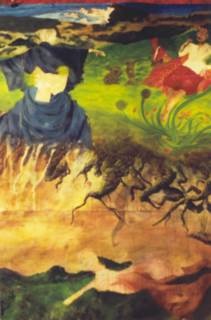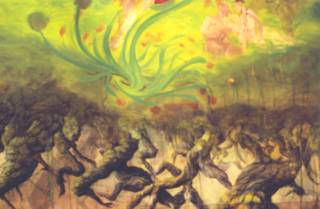Tsiganka sueños
Travelling and random thoughts of beauty
Saturday, May 29, 2004
Thursday, May 27, 2004
Firefly season
As I was walking home tonight with some friends, trying to avoid cicadas flying into my hair and the return of the mosquitoes, I was blessed with the gentle flash of fireflies. I had been waiting to see them again, as they don't really have them in San Francisco or anywhere else I have ever lived. Or perhaps I just never saw them... I love the gentle pulse of light that comes out of nowhere and brings a smile to my face. The Georgians, (republic of, that is) have the most perfect word for them, tsitsinatela, or plural tsitsinatelebi. It is such an onamonapeatic language, with the pulses of soft green light almost humming tsi! tsi! I always wondered where they went during winter. Do they hibernate, or does the green light only come out in summer?

tsitsinatela, or firefly in Georgian script
Wednesday, May 26, 2004
Monday, May 24, 2004
Jasmine tea

Jasmine tea on a rainy day at 555 Divis in SF.
If one normal not historic place in San Francisco should ever be made a museum, it would be 555 Divisidero, as it is a place of mystery, intrigue, philosophic thought and trap doors (not in the literal sense). Every time you pass through the entry, something changes in yourself as you walk up the steep staircase and greet the eclectic dwellers. As it is still a private residence and it wouldn't really be magical without the inhabitants, museum it will not become for now, however through stories there will be visitors.
Sunday, May 23, 2004
Are human beings objects of fair trade?
A brief overview of the current crisis in Sudan
For the last thirty years, a brutal civil war has continued with the Islamic government in the north providing armed militias with automatic weapons to wage a ‘Holy War’ and islamize by force, the Christian black south, where there are important oil reserves. The government incites soldiers to violence in saying that black Africans in areas controlled by Sudan’s democratic opposition, are enemies of Islam, and therefore may be killed, tortured or enslaved. The government unofficially allows the raiders to keep whatever they can, including human beings as slaves, as payment from the government. The government denies their involvement in the problem. Only women and children are captured and enslaved, due to the inability to train young men into ‘useful and harmless slaves’. Old men and women are usually beaten and robbed.
Some NGOs have begun campaigns raising money on redemption campaigns in the Sudan where families are assisted “who do not have the means to buy back their loved ones”. The slaves are purchased in Sudanese pounds from slave retrievers who bought the slaves from their masters. In the majority of cases, the problem is not whether the people being ‘freed’ are legitimately enslaved, but rather the slave trade is becoming more profitable for the raiders. Although the methods seem reliable enough, matching a list of retrieved slaves with those on the local list of abductees taken from the villages, many scams from desperately poor villagers have also taken place due to the increased western interest in the slavery issue.
The main ethical question involved in the policy of slave redemption is whether the ends justify the means. Is it legitimate to assign a financial value to a human being as a means to bring a loved one back to their family? Redeeming slaves is a quick fix to a rather complex social problem, bringing benefits in the short term but complicating the issue in the long run. The majority of the NGOs in Sudan involved in humanitarian assistance agree that the situation has become worse. According to James Jacobson, the ex-Washington representative for Christian Solidarity International, one of the main NGOs involved in slave redemption, slavery has become more profitable than narcotics. Raiders who originally were involved in other contraband activities now focus primarily on slavery. Giving money to the slave traders helps them to buy more guns and raid more villages. Before the westerners got involved in the mid-nineties, supply had outpaced demand and prices of slaves plummeted, threatening to put the traders out of business.
Another more viable and productive long-term solution to ending slavery is through political pressure. A substantial amount of press and controversy has been generated due to the slave redemption program and public interest in the subject has increased. Substantial political lobbying has increased including a speech by Bill Clinton stressing the need to abolish slavery in the Sudan. However, speaking about the problem is not going to overthrow the repressive dictatorial military regime in power.
Unfortunately, the difficulty of the situation is further complicated by the history of the sad state of politics in Sudan. Since 1898, the black Christian south and the Muslim Arab north have been governed separately through Anglo-Egyptian colonial rule. With independence in 1956, civil war broke out due to the extreme difference of history, culture, religion, race and geography of the two regions. Since 1983, when President Nimeiri imposed strict Islamic legal code based on the Qu’ran and other writings of Mohammed called Shari’a law, a forced an Islamization/Arabization process has occurred through repression in the north and the terror of slave raids in the Sudan's African south. Due to the corruption of the government itself and the government’s participation in creating human suffering in the south through the government’s soldiers raiding the UN food aid packages dropped in the black Christian ‘rebel’ areas, famine was created. Possible solutions for the widespread famine are impossible until the conflict between the two sides is resolved or unless organizations go against the government and aid the ‘rebel’ south directly without advising the government. It has been suggested by various NGOs that one of the solutions to the Sudan’s problem would be to have soldiers help distribute the food, or involve other types of humanitarian intervention but then the problem of international law enters the scene. Unfortunately, this conflicts with a country’s right to control its own territory, as guaranteed through international treaties.
In conclusion, the solution to the end of slavery in the Sudan will only be accomplished through peace, which involves the government’s end to attempting to force the Islamic faith on the Christian south and encouraging armed militias to raid villages in the name of religion. However the government does not acknowledge officially its part in the war, claiming it is mostly a ‘tribal conflict’, and stating it prefers ‘peace with separation than unity with war’ (Elfatih Erwa Sudan's Ambassador to the United Nations). This is a clever statement from the part of the government because it knows Egypt would never accept partition of the country, as they would like to have the Nile pass through as few countries as possible. The Sudanese government would also never accept it due to the oil fields in the south. The abolition of slavery in Sudan will only be achieved when the civil war comes to a long, well-deserved end and a worthy government can install security in the area.
Saturday, May 22, 2004
17 years in the root of a tree
The Cicadas are quite difficult to ignore. Anyone on the East Coast probably has realized this by now due to the constant drum of a buzzy hum. You can even hear them over the garbage disposal and the air conditioning, which is very impressive. There must be a substantial amount of them to be so strongly heard. It is really uncanny. I don't believe I had heard anything about them until I read some article about cooking Cicadas. Apparently they live in the roots of trees for 17 years and then they make their way to mate and leave eggs and die. It's a bit like Salmon, but I don't believe they have 17 years.
The sounds are while they are attracting mates, I guess they don't flirt at night as it is quiet now.

The infamous mating of cicadas. Taken by Vladimer Shioshvili.
Thursday, May 20, 2004
M-I-C-K-E-Y M-O-U-S-E Taliban Style

See how quickly the Taliban adapt to the American fashion industry after the invasion in Afghanistan. Artist: El Roto, showing at El Fórum in Barcelona til the end of May. Photo taken by Elena Mengual
Friday, May 14, 2004
Thursday, May 13, 2004
The Samurai and the Devil

I like to describe this one as the Samurai vs. the Devil. Photo, as always by Stephanie, painting by Daryl Bates. I am not sure why but seeing this painting has a relaxing effect on me. Almost like someone is taking care of you.

This section of Daryl's painting reminds me of a Nike ad, inspired by Dante's purgatory. One of the reasons I like this painting so much is that it truly challenges how you view life, as spirits are shown as roots to the beautiful flowers that are growing.
Wednesday, May 12, 2004
21 Candles
My brother's birthday is today. He is turning the big 21. Amazing how time flies isn't it. Anyway. I am out in San Francisco this week for his birthday and lots of meetings with NGO's in the area. I forgot how cold it is here at night, even in Spring/Summer. It is a pain at first and then you think, hmmmmm. I guess it saves on air conditioning.
Monday, May 10, 2004
PR campaigns for Israeli soldiers?
So, as I was making my way through San Francisco today to make it to my various meetings. I happened upon a public relations piece for the Israeli soldiers. It was a huge billboard showing the humane side of the soldiers doing some of their decent things. It was very strange, considering I didn't think all of San Francisco were that much of activists to dislike them that much that the advert was so necessary. It really did catch my eye, more so that it was there than it was necessary. I saw it as being quite clever on the behalf of the person that put it there...A couple of months ago I saw a full page ad in the Economist about the wonders and greatness of the Saudi government about how tolerant and gracious they are with their people. That commercial piece was very much more comical as it seemed like it was needed more. Anyway just something to think about.






